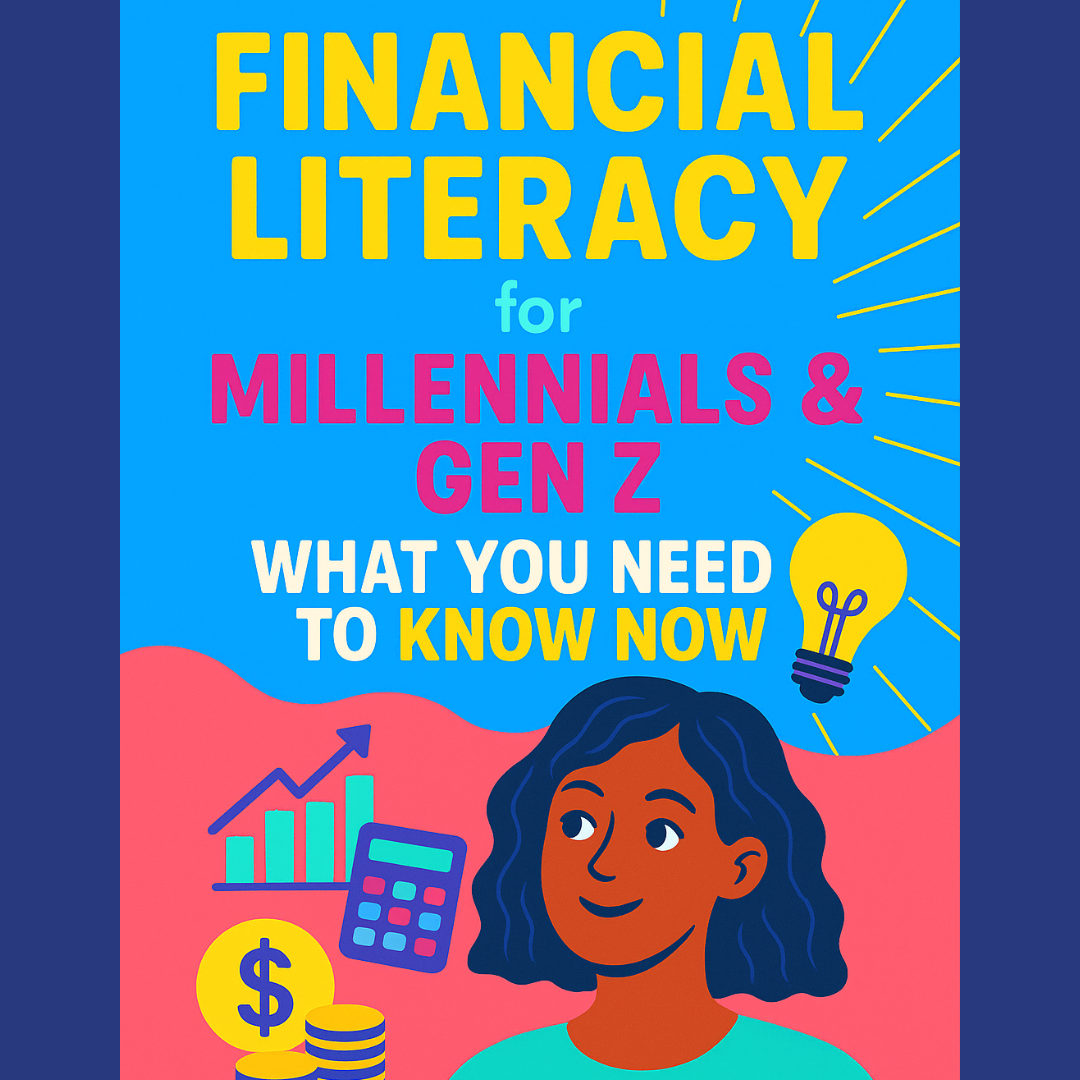Financial literacy isn’t just a buzzword—it’s a life skill that can define your freedom, your peace of mind, and your future stability. For Millennials and Gen Z, learning the basics of personal finance has never been more critical. With student debt at an all-time high, the gig economy reshaping the workforce, and inflation changing the cost of living year after year, knowing how to manage money isn’t just a nice-to-have; it’s non-negotiable. The earlier you start mastering financial literacy, the better equipped you’ll be to avoid pitfalls and build wealth in a world that constantly demands more from your wallet.
Let’s start with the basics. Financial literacy is the ability to understand and effectively use various financial skills, including budgeting, saving, investing, and debt management. It means making informed decisions about your money and developing the mindset and habits that will carry you toward long-term financial independence. Unfortunately, most schools don’t teach this, and many young adults are left to learn through trial and error. That’s why this guide is here—to equip you with the tools, insights, and motivation to take control of your financial life.
One of the first and most foundational steps in financial literacy is understanding how to budget. Budgeting isn’t about restriction; it’s about freedom. It gives you the ability to tell your money where to go instead of wondering where it went. The 50/30/20 rule is a great starting point for beginners. Allocate 50% of your income to needs, 30% to wants, and 20% to savings and debt repayment. Tools like Mint, YNAB (You Need A Budget), and GoodBudget make tracking expenses easy and even fun. Budgeting apps allow for automation, notifications, and visualizations that help you stay accountable to your financial goals.
For Millennials and Gen Z, student loan debt is often the elephant in the room. While it may seem overwhelming, there are ways to manage it strategically. Start by understanding the terms of your loans: interest rates, grace periods, and repayment plans. Consider consolidating loans to secure a lower interest rate or switching to an income-driven repayment plan if you’re struggling. The key is to not ignore your debt. Make at least the minimum payment to avoid penalties, and pay extra when you can. Even small additional payments can shave years off your loan term and save you thousands in interest.
Saving is another cornerstone of financial literacy. Emergency savings should be a top priority. Aim for three to six months’ worth of living expenses in a high-yield savings account that’s separate from your everyday checking. This fund is your safety net against unexpected events like job loss, medical emergencies, or car repairs. Once your emergency fund is in place, focus on other savings goals like travel, big purchases, or a down payment for a home. The trick is to make saving automatic. Set up auto-transfers from checking to savings every payday so you don’t have to think about it.
Credit plays a massive role in your financial life. Your credit score affects your ability to rent an apartment, buy a car, or get approved for a mortgage. A good credit score can save you thousands in interest over your lifetime. To build and maintain healthy credit, always pay your bills on time, keep your credit utilization below 30%, and avoid opening too many new accounts at once. Consider starting with a secured credit card or becoming an authorized user on a trusted person’s account. Monitoring your credit score regularly through free services like Credit Karma can help you stay on track and catch errors early.
Now let’s talk about investing. This is where your money starts working for you instead of the other way around. Thanks to technology, investing is more accessible than ever. Apps like Robinhood, Acorns, and Fidelity make it easy to get started with as little as $5. The earlier you begin, the more you benefit from compound interest—a powerful force that grows your money exponentially over time. If your employer offers a 401(k) with a match, contribute at least enough to get the full match. It’s essentially free money. For long-term goals, look into IRAs (Traditional or Roth), index funds, and ETFs. Investing isn’t gambling when done right; it’s a disciplined, strategic way to build wealth.
Another critical area of financial literacy is understanding taxes. Many Millennials and Gen Zers are surprised when their first paycheck is smaller than expected due to withholdings. Learn how taxes work, what deductions you’re eligible for, and how to file your own taxes using software like TurboTax or FreeTaxUSA. If you’re freelancing or earning from side gigs, remember to set aside money for self-employment taxes and track your expenses for deductions. Understanding taxes empowers you to plan better and avoid surprises during tax season.
Financial literacy also involves understanding insurance. While it may not be glamorous, insurance protects you from catastrophic financial losses. Health insurance is essential, especially in a country where medical bills are a leading cause of bankruptcy. Renter’s insurance protects your belongings in case of fire or theft. Auto insurance is a legal requirement in most states, and life insurance becomes important once you have dependents. Evaluate your coverage annually and shop around for better rates if needed. Insurance is one of those things you hope to never use but can’t afford to skip.
One often overlooked component of financial literacy is setting financial goals. Without a clear target, it’s easy to drift. Set SMART goals—Specific, Measurable, Achievable, Relevant, and Time-bound. Whether it’s saving $5,000 for a Europe trip in 12 months or paying off $10,000 in debt in 2 years, having concrete goals keeps you focused and motivated. Write your goals down and revisit them regularly. Adjust as needed, but always have something you’re working toward.
In addition to setting goals, track your net worth. Your net worth is your total assets minus your total liabilities. It’s the clearest picture of your financial health. You can track it manually on a spreadsheet or use tools like Personal Capital. Watching your net worth grow over time is incredibly rewarding and helps you stay engaged with your financial journey.
Millennials and Gen Z are uniquely positioned to leverage technology for financial literacy. Podcasts, YouTube channels, blogs, and social media accounts dedicated to personal finance make learning accessible and engaging. Follow credible voices who explain financial concepts in relatable ways. Read books like “Your Money or Your Life” by Vicki Robin or “I Will Teach You to Be Rich” by Ramit Sethi. Knowledge is power, and you have more tools at your fingertips than any previous generation.
But financial literacy is more than just knowledge—it’s action. All the tips, apps, and tools won’t help if you don’t take the steps. Start small, be consistent, and don’t be afraid to ask for help. Talk to a financial advisor, join online communities, or take a free course on money management. There’s no shame in not knowing; the real loss is in not learning.
As Millennials and Gen Z shape the future economy, your financial choices will ripple through generations. Whether you’re paying off student loans, saving for your first home, launching a business, or planning for early retirement, it all starts with financial literacy. Don’t wait for a crisis to force you into action. Start now. Learn the language of money, speak it fluently, and teach it to others. You have the power to transform your financial future—and the future of everyone who looks up to you. Make it count.




